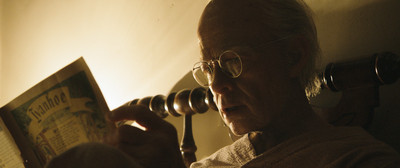‘The Curious Case of Benjamin Button’
While watching "The Curious Case of Benjamin Button" -- all 167(!) minutes of it -- I kept thinking of Joni Mitchell's song "The Circle Game" and its rueful, poignant chorus:
And the seasons, they go round and round
And the painted ponies go up and down
We're captive on the carousel of time --
We can't return, we can only look behind from where we came
And go round and round round in the circle game ...
It took Joni less than five minutes to make that observation.
It takes "Benjamin Button" close to three hours, demonstrating (yet again) that more isn't always better.
Sometimes it's just too much.
"Benjamin Button" is nothing if not ambitious -- especially in its consideration of the Big Picture. (Otherwise known as Life and What It All Means.)
In pondering that Big Picture, however, "Benjamin Button" often falls under the spell of its own epic sweep, inviting us to join its makers in marveling at the marvelousness of it all.
At least in the special effects realm, the movie is indeed a marvel, convincingly depicting the strange and sometimes wondrous life of its title character (Brad Pitt).
A framing story, set in New Orleans on the eve of Hurricane Katrina, finds a devoted daughter (Julia Ormond, Pitt's "Legends of the Fall" leading lady) at the bedside of her dying mother, who asks her to read from the diary of her old friend Benjamin Button. (Needless to say, you won't find this narrative thread in F. Scott Fitzgerald's original story.)
This Benjamin Button's a curious case indeed. Born as World War I dies, he's the size of an infant, with the mind of an infant, but the face and physical ailments of an 80-year-old man.
Horrified by this seemingly monstrous offspring, Benjamin's father (Jason Flemyng) deposits him on the steps of a retirement home, where the loving Queenie (Taraji P. Henson) finds and adopts him.
And while Benjamin seems perfectly at home amid the frail and feeble, he inexplicably gets younger as the years roll by.
He's a spry septuagenarian when he meets Daisy (who shares her first name with Fitzgerald's "Great Gatsby" heroine), visiting her grandmother at the rest home.
Daisy will grow up to look just like Cate Blanchett (Pitt's "Babel" leading lady) and dance (just like Fitzgerald's wife, Zelda). Someday, maybe, their timing will be right.
Until then, Benjamin's adventures take him around New Orleans -- and around the world -- in the company of such colorful companions as a pygmy-about-town (Rampai Mohadi), a salty tugboat skipper (Jared Harris) and a British diplomat's wife (Tilda Swinton, Pitt's "Burn After Reading" co-star), who opens Benjamin's eyes, and heart, to the wonders of love.
As the seasons go round and round -- and as we wait for "Benjamin Button's" title character to emerge as a buff, beatific Pitt -- screenwriter Eric Roth yanks us back and forth in time, piling on the platitudes.
Roth's been this way before. (He did win an Oscar for his "Forrest Gump" adaptation, after all.)
And "Benjamin Button" recalls "Gump" in a variety of ways, from its first-person voice-over narration to its reelin'-in-the-years story line. (It certainly resembles "Gump" far more than Fitzgerald's original story, in which Benjamin arrives, in an 1860 Baltimore hospital, as a newborn old man with a smoke-colored beard, sparse white hair, a quavering voice -- and a fully developed sense of sarcasm.)
Director David Fincher, however, hasn't really been this way before. And it shows.
A vivid visual stylist who seems to prefer dark, edgy thrillers ("Zodiac," "Fight Club" "Se7en" -- the latter two starring Pitt), Fincher's at home with the story's technical demands, taking full advantage of advanced computer trickery to render Benjamin's metamorphosis credible.
Yet, when it comes to matters of the heart, Fincher seems a bit reluctant to dive in.
Granted, this approach spares us from having to slog through a bayou of bathos. (For which some of us, at least, are truly grateful.)
But it also keeps the movie from fully connecting on a human level. We're often so busy noticing the effects that make Benjamin's journey possible, we're not paying attention to the journey itself.
Pitt's performance doesn't help matters.
Playing an essentially passive character -- stuff happens to Benjamin, not the other way around -- he's not only passive but impassive. By failing to clue us in to what Benjamin thinks, and feels, about all the strange things happening to him, there's a disconnect between Benjamin's outward and his inward states.
Such an approach enables audiences to project their feelings onto him -- or it would, if "Benjamin Button" connected on a level deeper than your average greeting card.
It doesn't, so we're left spinning on that carousel of time, as time takes its toll on Benjamin Button.
He may ride backward while everybody else rides forward, but the direction doesn't really matter much when you're only spinning in circles.
Contact movie critic Carol Cling at ccling@reviewjournal.com or 702-383-0272.
Review "The Curious Case of Benjamin Button" 167 minutes PG-13; brief war violence, sexual content, profanity, smoking Grade: C+ at multiple locations















